#because the narrative lens can't confront
Explore tagged Tumblr posts
Text
This is a scrap - and should be read as a criticism of the story telling moreso than of the (fictional) characters - but...
One of the results of Season 4 framing Adora as purely a victim of "crazy ex" Glimmer - Presenting it as if Glimmer was reacting to nothing, that Adora wasn't controlling or jealous or secretive - is that it deeply undercuts the idea that Adora treats Catra badly because She Just Doesn't Know Better.
If Adora treats Glimmer in the same (bad) ways she treated Catra, then it tells us she has flawed assumptions about what a "good" relationship looks like; that her behaviour (if not innocent) is at least sincere, and that she is continuing to apply bad models even in a situation where it does not benefit her(or anyone but Shadow Weaver). Having these models fail her would drive the character towards self-examination and personal growth.
But if Glimmer was the core problem in Season 4 - if Adora was nothing but supportive, even when the circumstances of her youth are recreated nearly 1-to-1 - then we're saying that Adora is already perfect, that actually she does know how to have normal, healthy relationships even under trying circumstances.
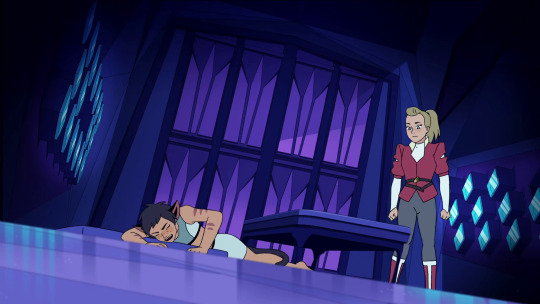
Which makes her refusal to extend that care to Catra incredibly suspect. Does she think that Catra is uniquely unworthy of respect?

Or does she just know that other people think Catra is unworthy of respect, and aren't going to say shit (especially when they still need She-Ra to save them)?
========================
Look, obviously none of this is the intended read; And fwiw, I think that at least the script of Season 4 actually does show Adora replicating her bad behaviours -
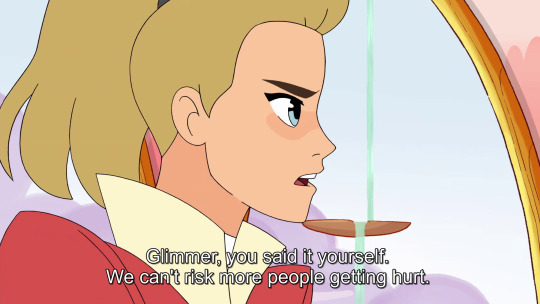

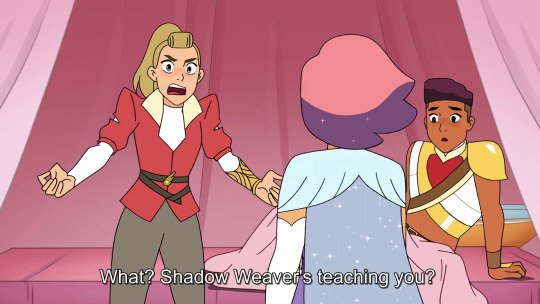
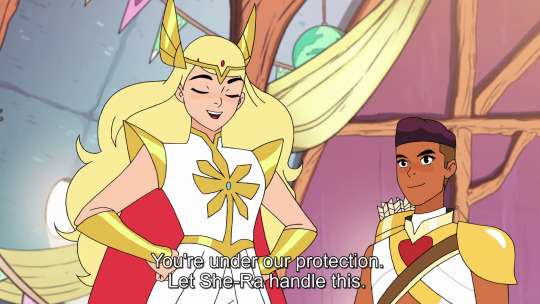
being high-handed, controlling, jealous of Glimmer's relationship with Shadow Weaver, and unhealthily invested in her role as The Hero -
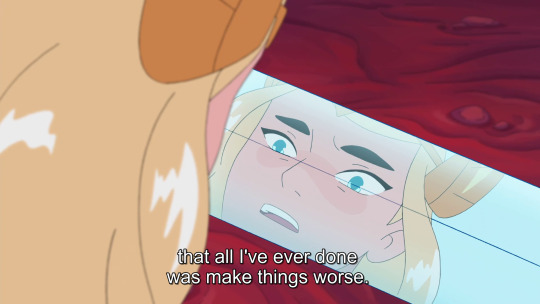

and then has those flaws drive personal growth - reflecting on if she is making things worse, recognizing that her idea of being A Hero is to be a weapon in someone else's hands and explicitly rejecting that -
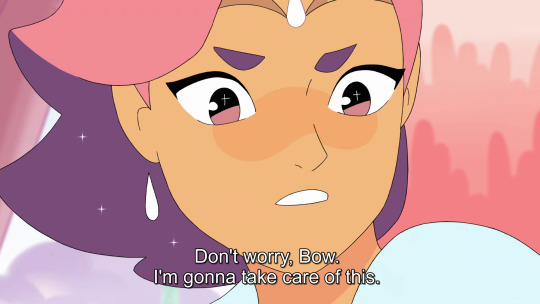


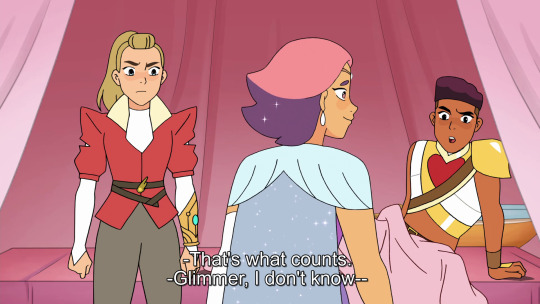

but that this is undermined by the directorial lens overwhelmingly framing Glimmer as The Villain (and thus Adora as In The Right/The Victim/Smol Bean), and that this conflict drives these really ugly implications.
In absolving Adora, the story inadvertently validates her beliefs - even the ones that it set up as false and harmful. Which, yeah, creates the implication that Adora knows when she's acting badly, but just doesn't care (and that we shouldn't either). That her status as "Good" protects her from criticism, and allows her to cast any opposition as defacto "Bad" and not worthy of acknowledgment or examination.
#spop#scraps#s4 cinemanarrative dissonance#meta#i guess?#again this is about the storytelling#the ways that the show undercuts its own themes#because it wanted to criticize and deconstruct heroic narratives#but also uncritically use them in traditional ways#so you get these problems#where Adora needs character growth#but is constantly denied it#because the narrative lens can't confront#that her shit just stinks#without trying to soften or excuse it#oh and don't get me started on how *incoherent* the villainization of Glimmer was#'stop running off alone by which i mean join planned missions with other people'#like this is just straight up “Adora acuses Glimmer of her own canonical flaws”#without even bothering to show Glimmer actually doing these things
19 notes
·
View notes
Text
In the original Adventure Time, Fionna wasn't really given any kind of personality. She's a self-insert for the romantic plights of other characters. Her stories revolve around love triangles, quirky relationship drama, and romantic foibles. And even within these stories, the drama is largely conflict free. No one's really at fault and all misunderstandings are cleared up without issue.
In comparison, Finn experienced a lot of major conflicts. He torpedoed his relationship with Flame Princess in one of the most uncomfortable and ill-advised manipulations I've ever seen in any fictional medium, to the point I was reluctant to ever return to the show afterwards. But through that mistake came growth and change. Finn made a lot of mistakes, but he learned a lot of lessons.
What's really interesting about Fionna and Cake is how it characterizes Fionna through that lens.
Fionna, created as a "copy" of Finn and Jake, was always the most mature person in the room. She was cute, graceful, and solved every problem without issue. But when she's only written like that, there's nowhere for her to grow. No room to change.
Adult Fionna is inherently irresponsible. She's flighty, abandons problems on whims, and she's oblivious to people's pain unless its extremely visible. When she travels through the multiverse, she views problems through narrative tropes. She talks about apocalypse rpgs and heroic fantasies. She's shockingly self-centered and ignorant to the suffering of others. When she looks at Simon, she can only see that she's "boring" compared to Ice King's "fun." She lived in a world with clear cut moral lines. No complications.
When adventuring for the "first" time, Fionna complains about the outfit. She can't move around well in the skirt. Prismo is baffled. "You never had any trouble with skirts in my stories." She wasn't written for practical considerations in mind. She was written for easy fun for a first-time writer.
As a form of escapism, Fionna is flawless. In the real world, Fionna has never faced a real challenge that forced her to grow up.
And what really just absolutely sells this writing choice is that the narrative doesn't make this as a potshot against fandom or womanhood. It doesn't look down on Fionna, it just communicates that this is the kind of person she became as an adult. There's nothing demonized about the idea of fandom or Fionna's womanhood. It writes Fionna this way because its interested in how she can be a real person, with real flaws. The moment to moment existence of Fionna and how she can function as a real person when the cameras turn off.
Fionna has to face challenge to grow as a person. She can only be a fully developed character when she gets the opportunity to be wrong, to make mistakes, when she's forced to think through her actions. And the show's willingness to confront this idea and what it means for Fionna's existence is so genuinely smart and compelling.
Adventure Time whips is what I'm getting at.
1K notes
·
View notes
Text
thinking about how essentially every relationship john locke formed in the early seasons of lost has completely disintegrated by the time of his death.
of course there's his relationship with jack, which starts tense but manageable and culminates in jack pointing a gun at john's head and pulling the trigger. but even his smaller, less narratively prominent relationships either implode or drift apart. he bonds with walt in season one but then walt leaves the island, which is itself a severing of their bond since it was mainly based on being the only two people who wanted to stay. still, he goes and visits walt off the island so this is probably john's most successful relationship. I dont think i need to explain how he fucked up with boone, "the sacrifice that the island demanded." charlie viewed john as a mentor and claimed to trust him more than anyone on the island, but after the events of fire and water, that trust is destroyed and charlie despises him. at the same time we get john bonding with claire and having a pseudo-paternal dynamic with her, but their closeness basically drops off the face of the earth as he gets less and less involved with the other survivors.
his arc in the series is essentially a gradual distancing from everyone around him. it starts when he abandons hunting (providing for the others) in favor of trying to get the hatch open (it's extremely clear his primary motive isn't any survival applications but getting answers to the mystery). when they do open the hatch, he spends more and more time inside, underground, cut off from other people. he spends more and more time interacting with ben, a human mystery box that he's obsessed with cracking even if it gets him killed. he follows the proverbial white rabbit deeper down the hole and leaves his connection to humanity behind. the island and its mysteries become more important to john than anything or anyone else.
then in season three we get him claiming to go undercover with the others only to unceremoniously tell sawyer that he's actually going to join them. and it doesn't feel shocking, it feels inevitable. because john has spent the entire series becoming less and less connected with the people he arrived with. in that sense he actually makes a fascinating foil to juliet, who is introduced as one of the others and yet never really fits, she's increasingly sympathetic and kind in a way the rest of them aren't, her redemption arc feels so natural that she actually starts referring to her old people as "the others" like she's been one of the crash survivors from the beginning. her and john basically have inverse arcs, which is probably accidental but very neat.
in season five john tries to convince everyone to go back to the island, and fails spectacularly. and of course he does, because he was so consumed by obsession that he stopped maintaining his relationships, and in many cases actively alienated people (this is also basically what happened with helen) and now he can't wrap his head around why they're all so hostile to him. i am forever obsessed with the scene where he confronts kate and she brutally calls him out for wanting to return to the island because he doesn't love anyone. it actually struck me on rewatch how well the two of them got along in season one, and how badly their relationship has degraded by this point. john repeatedly casts aside interpersonal relationships in favor of his obsession with destiny, so when said destiny actually involves persuading the people he once shunned, he's at a loss. this is because john treats purpose as a supplement for connection, destiny as an alternative to love.
as an aside, this aspect of john's character kinda ties into my opinion that several lost characters can be read as allegorically neurdivergent under a certain lens. i know this was absolutely not intended, but as an adhd former gifted kid who struggles socially, there is something uncomfortably familiar about a character who allows their relationships to burn around them because of a single-minded obsession, especially as a result of being promised the fickle status of "special."
tl/dr: john locke is a doomed idiot and i love him
#i swear i did not intend for this post to get so long#i could've said even more#like how he latches on to the concept of destiny because it both vindicates his own suffering and exempts him from needing love/affection#because he needing those things is what made john keep returning to his father and he never wants to feel vulnerable like that again#if you never get attached to anyone then they can never leave you etc.#unfortunately destiny is also. a fickle bitch#ARGHHHH I NEED TO WRITE AN ESSAY#i have so many thoughts and so little time/motivation to write#i still need to finish my fic it's so close to being done#but productivity abandons me#just like destiny....#sorry#john locke#lost#lost 2004#lost abc#lost tv show#lost tv series#ben linus#jack shephard#charlie pace#boone carlyle#claire littleton#kate austen#juliet burke#character analysis#ig?#mini essay#walt lloyd#my silly rambles
114 notes
·
View notes
Text
Something I noticed as a young adult and budding trans woman are that games with character customization, or at least character building in some way, are very overwhelmingly two different options: men only, or men and women only. Very few of these games were women only, and I kind of jokingly refer to them as "games that would have cracked my egg".
Now I want to preface this with two things: one, this absolutely could be a matter of the genres I was in; and two that not every game that has male AND female options is doing so in a way that is lazy and there are several which make the gender choice impactful in meaningful ways. I want to refute these to a point because I know they're going to be brought up.
First, I mean as a kid I typically played RPGs. I wasn't the type of person who absolutely was only in the "macho" genres that were out there, and I mean I played a shit ton of Final Fantasy 6 and 13. RPGs with female protagonists are very real (and was a big reason why FF13 failed with the Youtube reviewer crowd), but there are basically none with a customizable female only protagonist. In addition, even despite this, why the fuck does genre matter? If your video game genre makes sense for a customizable character, it can make sense to have a female only game in that genre!
Second, this isn't necessarily a point about whether customizable female characters exist in the space at all, but this is a point much rather about how male protagonists are considered the default, and a male protagonist default usually informs A LOT about the game design and the world built around that character. In addition, for every game that gets this right, there are usually five more that don't, and the female character is treated functionally identically to the male character except they have to Ctrl+F all the times they use "he" in the game's script. This is why you get games that are aggressively heterosexual but because they did relatively zero work integrating a female protagonist, they accidentally give off big lesbian vibes. It's the same principle for why the representation for your game shouldn't only be paper-thin bisexuality.
Games with female main protagonists are often notably less common than ones with male main protagonists, and many times, this is buffered a bit by the addition of an ensemble cast. What makes FF6 and FF13 notable amongst their peers, including games like FF16 which have "female protagonists", is that the strongest female protagonists often form the narrative core of the story. FF6 has a large ensemble cast, but it is the struggles and efforts of Terra and Celes that drive things forwards, and to go into how Lightning, Fang, and Vanille form the narrative and emotional core of FF13 is a subject to an entirely different post. But like they still exist.
So many games have self-insert male characters compared to female ones. I'm genuinely surprised when I find a game with a character creator that only has a female protagonist. It is something that says a lot on the general sexism and misogyny in gaming spaces, how the male video game player is still considered the defacto default audience, and how worlds often aren't considered through the lens of female characters, or even just the perspective of a female player.
But on a more personal note, it's just...sad. Genuinely. I probably would have realized I was trans a few years earlier than I did had there been games like that out there and more in the public consciousness. So many games provided a cover in having a male option (and especially since so many of these games are aggressively heterosexual lol, looking at you Mass Effect) that I never needed to confront my feelings. It makes me feel bad than even to this day an entire audience of players aren't really considered as important.
Why can't we have games for us, you know?
32 notes
·
View notes
Note
Expand on current narrative that means byler? Because biased based theories aren’t a narrative I could argue a whole theory that Joyce and Karen want to get down and dirty with time and screenshots and easily led “narrative”
Although i'm not as articulate or as expert in expressing my opinions on this as I would like, i'm willing to try my best to explain to anyone who will politely listen.
Quick note: Using "bias" would mean that I treat Byler with higher status, and that I don't listen to any Mileven perspective, even if it's objectively the right one. Both ships have a shot, I just lean to the Byler side, but that doesn't mean i'll never listen to a Mileven. I'm more than open to hear why that perspective makes sense to them.
That being said, the first thing I would like to say is that technically, yes. You could argue that Karen and Joyce would be into something like that. But it's obviously not anything like Byler, specifically considering that there isn't a love triangle situation going on between Joyce, Karen, and Hopper.
Again, you are correct in the sense that these are simply theories, and anything can be the outcome at the end of the day, but it's more likely for Byler to happen than Joyce/Karen. The relationship between Mike and Will has been explored far more than an example like that. By that comparison, Byler's chance skyrockets.
-Karen/Joyce haven't had scenes with [tender, emotional music playing],
-Karen/Joyce haven't had the most obvious queer coding,
-Karen/Joyce haven't been confirmed by the Duffers that one has been canonically in love with the other through the whole show,
-Karen/Joyce don't have a famous love triangle where people debate wether or not Joyce wants to leave Hopper for Karen,
-Karen/Joyce aren't being promoted along with the other couples in posters or general media for the show,
-Karen/Joyce are not in a similar situation to Byler.
Now that we've established which is more likely, let's remove the comparison, and talk of Byler generally.
I've always said: there's always a ship for anything. So it isn't really a surprise that there were big Byler stans back in 2016, and I can't count that as proof. What's bigger proof to me is how many people have become stans now. There's such a large community of Bylers on tumblr who genuinely believe they'll end up together, and they're dedicated fans. I've seen this show sixteen times, and the past six watches have given me confidence that they stand a good chance. Their story makes sense to me in a lot of ways, mainly being the general idea for the love triangle.
Let me explain the Byler plot through my lens.
Imagine this: Two best friends since kindergarten. One day, Boy1 meets Girl. Their friend group keeps insisting that they like each other, so Boy1 gives in and says, "Why not? It's all part of growing up anyway, right?". Boy2 becomes jealous and sad that Boy1 is pushing him away for Girl. What Boy2 doesn't know is that Boy1 and Girl aren't the happy couple he thinks they are. Boy1 feels unfulfilled in this relationship, and he feels strange about his friend. In hopes that these feelings leave, he pushes Boy2 further away. Because of obvious tension, Girl confronts Boy1 about why he can't say "I love you". And it's simple. He can't say what he doesn't mean. Friends don't lie. Girl and Boy1 know they aren't in love, but for the sake of normality, they pretend. (Next is my idea of after canon) They eventually talk about everything, and feel at peace. They become best friends who want nothing more. Boy1 grows more comfortable with his feelings for Boy2, and they even flirt sometimes. Something dangerous has returned to their small town, and stress is high. Through this stress, their bond is even closer, and they confess the years of feelings they have. Maybe a smooch?? Who knows. They're secret for a bit, but when they tell people, everyone is happy for them. Boys who've been pining for years, but couldn't say anything about it because of heteronormativity(rip), finally have their happy end.
That's a dramatic run down of how I see their relationship going. Again, you don't have to agree, but since you asked, that's how I see it. There are also other things that aren't in the show itself, that I find interesting. They constantly promote Byler along with Jancy, Lumax, and Jopper, meanwhile El always has her own posters/pictures. They use a song between Lumax for a Byler scene (we know how important music is). Mike's top Spotify song is "Smalltown Boy", a song about being gay in a smalltown and wanting to run away so you can be out. There's also "Are Friends Electric?" in the playlist (I think the title explains itself). Honestly there's a lot his playlist says, but those are my top picks for kinda fruity.
ANYWAY, i'm sorry that this was a bit long, i'm just not one who's very good at explaining what I mean with fewer words. I hope you understand better why I see them becoming a thing, and why I wouldn't say it's an unfair bias. I think both have a chance, but this is my take on why this makes more sense to me. Thank you for asking! This took me way too long to write, but I hope it helped.
#byler#stranger things#mike wheeler#will byers#byler endgame#byler is canon#byler nation#byler tumblr#byler is real#stranger things theory#anti milkvan#anti mileven#mileven#asks#anon asks#anon ask#byler parallels#byler proof#byler theories#byler stranger things#byler analysis
41 notes
·
View notes
Note
I love your tlw thoughts sm!! :D
I'm on like my sixth rewatch currently and I've been curious about how Chas seems to handle the "Mick" situation and I was wondering if you had any thoughts on that in particular?
aahh thank you so much!! ❤️❤️ that's such a good question! i will say as much as i have to say about it (very incoherent i'm afraid) + then would be VERY curious to hear your thoughts on the matter as well
it makes sense to me that chas doesn't react to the mick thing straight away. well, he tries to deny/avoid it, appropriately enough. he internalises the stress of it to avoid making it joe's problem. not necessarily the right or smart thing to do, but i genuinely think he is trying to be kind & generous by trying to ignore it. when he finally brings it up, it's reluctant – apologetic, even. he only mentions it because he can't help it anymore. i think he dislikes being (or seeing himself as) the sort of person who always has to say what he's thinking. and he feels bad for bringing down the weekend.
so, focusing specifically on the confrontation scene, as it turns out i have a lot of feelings about that (i mean how could i not, it's such a good scene). it's serving an important purpose wrt chas's characterisation and, because it's a very well-written episode, it's all in service of making the final twist more painful
firstly: "i don't mind. it's just that we normally tell each other when we're flirting with someone, and we laugh about it." just to make sure you know it's not the texting someone else that bothers him, it's the possibility that joe could be keeping a secret from him. because oh how very OPEN and TRUTHFUL they usually are with each other! how they always tell each other everything!
secondly, when he finally works up the courage to confront joe about it, he is .... i want to say gentle about it. he's not angry, he doesn't even speak loud enough for joe to hear him. he's sad, vulnerable, apologetic & clearly ready to forgive; all he wants is the truth. he confesses his own kiss with another guy, even though he could easily have gotten away with not saying anything, which i think is particularly significant for once again underlining the value he's placing on honesty & openness. and he instantly accepts the explanation joe gives him with no evidence. } all of which to say:
essentially what we're seeing here is chas reaching a character development apex. literally in that confrontation scene i think we see the culmination of his personal journey over the past nine (or eighteen, or forty-eight) years, where he has finally become the sort of person who will handle this situation in this specific way. (draw a parallel with reaching the penultimate/"depression" stage of grief, where it falls in the episode.) in a different context, it might be something to celebrate. on the positive side, he is no longer the angry person he was 18 years ago! he no longer lashes out! he has learned compassion and is willing to take responsibility for his own mistakes! and to look at it through a darker lens: joe has finally finished manipulating him into the perfect victim! narratively this scene is the end of the road for chas, there's nowhere else he has left to go except his finale
when he finds out mick is a woman, he says: "i've never been so happy." :) that's how you know the end is nigh of course. the betrayal isn't brutal enough unless it comes at the exact moment of maximum contentment, trust, and love. essentially the whole mick ordeal is there to test his trust in joe, to make sure it's finally 1000% solid and ready to be exploded
– by that i mean the script put it there to test him as a narrative device, but i suspect it was also an in-universe test/game. you're telling me joe has maintained this elaborate deception for years, and now suddenly he's leaving his phone lying around? he was doing it on purpose, to set chas up for the "worry -> relief & Peak Happiness -> ultimate betrayal" pipeline. absolute mad lad. someone capable of that has got to be INCREDIBLE in bed. makes you wonder what other little games he set up to torment chas over the years
#tysm for the ask it has made me v happy!! love to write about this show and this ep especially :)#i hope this made some kind of sense and plsss let me know your own takes if you have em!!!#the last weekend#inside no 9#in9
17 notes
·
View notes
Note
Hello Mr. Haitch! You inadvertently recommended the Southern Reach series all the way back then… so of course, I bought the book Annihilation.
I’m only on page 61, but by page 9, I knew that this book was probably going to be my favorite for this year. The thing is, I probably would have devoured it all in one go if I didn’t stop to jot down notes and ideas every five pages. This book has already given me an existential crisis.
Can we have a book discussion?? There are just so many thought-provoking quotes. But for now I’ll only show one (from page 8):

I have quite a few thoughts about this line. First of all, this is what drives the biologist: it’s the reason why she’s in Area X and why she’s there to stay. And it also relates to her identity. There was this one line… I didn’t save it… where she admits to pretending to be a biologist. She’s simply someone in pursuit of knowledge. Or the “truth.” Some understanding of why things happen the way they do.
(The urge to connect the theme of pretending… but it should be saved for another time.)
If someone asked me why I like exploring character analysis, I’d say to learn more about the characters. But if they ask me why I want to learn more specifically, I don’t really have an answer to that. Like the book said, it’s a “self-immolating desire.” Curiosity is something that needs to be satiated.
Lastly, this quote made me wonder… does truth even exist? Is it just something that humans made up? Because everything is based on perception, with what we perceive with our senses which is where it becomes subjective. It’s the reason why the same event can have a different event from two different narratives. Like in JJK, the cycle of war between curses and humans, for example… hold on, I feel like this is an interesting opportunity to connect the idea of “truth” to Mahito. Because he’s kinda like “I know more than you, I know how things actually work” with the soul and body theory. Oh… well that’s just a tangential idea I have not developed yet, and I’d have to go back and take a closer look at his character. Anyways, I found this interesting because the “self-immolating desire” is what drives some people’s choices, decision-making, and purpose. And it brings up the question of whether in the long haul, it is a hopeless pursuit.
Ehh, I just came here today to prompt something maybe relatively interesting. You’ve already read the book, so this isn’t anything new to you of course. But I am in dire need of discussion or I might actually combust and never finish the book 🥲🥲
Curious to hear what you have to say,
formerly curious anon but not anon anymore
Amazing, people normally ignore my book recommendations as being too esoteric, and I am delighted to see someone else joining the freakish Vanderfamily.
You've hit on the core challenge the Biologist faces: she wants to be objective, to be impartial, but knows she can't be. She knows no one can be truly impartial or objective - to be sentient, to hold thoughts, feelings, opinions, to have experienced or learned anything is to see the world through a lens or a filter. We might be aware of the lens, its edges, or the way it distorts the light, but we cannot completely remove it.
To live, to exist, to be is to become a subject, an individual, a perspective.
What she's pushing against is Area X's unknowability. Its inherent alienness, its knack for altering and shifting depending on who is looking at it and how they're looking at it. It's a living, breathing manifestation of humanity's epistemic limits and it is horrifying. It is indifferent to us and that is the source of much of the series' psychic horror - that the thing which might destroy us doesn't even know we're there. Or if it does, we're a momentary blip on the radar that is easily forgotten.
It's a confrontation, a fundamental and necessary one from Vandermeer's perspective as the entirety of the Southern Reach series is an exploration of climate change and ecological collapse, and humanity's reaction to it. The government agency responsible for studying and controlling the thing has got nothing, no useful plans, no solid theories; not even metaphors to grasp Area X. They're just doing the same thing over and over again, hoping this time something will be different, this time they'll see, or hear something, or a switch will flick and all will be made clear.
The Biologist, then, is an argument towards acceptance. Accept where your limits are, what you do know and what you cannot know. Try to understand and appreciate things on their own terms, and see yourself in the context of the cosmic whole rather than in our modern notions of isolated individuality. Feelings of nihilism are part of this process, of shedding old meanings and old purposes but only so we can be free to find new meanings and new purposes that make space for the world.
There's a lot to unpack in this book and I am here for any discussion of any length on this series, because I love it with an intensity normally reserved for stars, nebula, and my wife.
Some of what I've talked about makes more sense if you can wrap your head around Timothy Morton's work on hyperobjects. It's pretty dense and borderline-mystical but I'm happy to expound on it at some point if you'd find that helpful.
12 notes
·
View notes
Text
I have to say, as a person that grew up watching Doctor Who and eventually lost interest, only to then pick it up as an adult again; the nuance of the portrayal of many of the relationships in the RTD era had to be one of the most surprising discoveries for me upon rewatch.
For a show that is silly ha ha for a large portion of it's existence, the human aspect of the RTD era is something I didn't truly appreciate until i watched it through my adult lens. You have such iconic companions such as, Rose Tyler, Martha Jones, Donna Noble all of which embrace both the negative and positive aspects of what it's like to be human. Their importance lies in their existence, and their ability to grow and learn from their experiences with the Doctor, who in turn is not above being portrayed as a flawed and traumatized person.
His trauma leads him to make decisions that may not always be the best, and the narrative goes out of its way to show that he's not always in the right. They affect his relationships to said companions, and in the end, it's these decisions he makes that lead him to regenerate alone. Because by not sharing the burden of his duties with the people that love him, he punishes himself to never truly heal from all the baggage and he pushes them away.
I believe this is why, although heartbreaking, it only made sense why the 10th doctor ultimately ends up alone.
He tells himself that he is cursed to live a lonely existence. That no one will truly ever understand what it's like to live as the last of his people, and although he may have a point in thinking that rules of his existence are drastically different from that of a human, he is wrong in assuming that we too don't also suffer from the same burden. And so, this is why him ultimately choosing the fates of those around him, against the wishes of those affected, is so unfair (and why he's often punished for it).
Not every human lives the entirety of their life span. It's the very short lives we live (in comparison to that of a time lord, I mean) that help us put into perspective what is truly important. We live our lives knowing that any day may be our last, but instead of wallowing in it, we continue on because that is one of the strengths of humanity: our ability to keep going. We don't forget our pasts, we confront it and carry it with us.
An aspect of humanity that we see him envy through out the run. The slow path, a simple life that is deprived of all the danger he loves but carries the security he lacks. He puts up a front, alienating himself from his companion's lives because he claims they're not worth the time of a time lord but in truth, he can't help but get involved regardless. Because he is not above the basic desire of companionship and love, and by attempting to deprive himself of it (by not being honest about his feelings to himself and those around him) out of an act of self preservation, he is left to wonder what would his life had been had he given in. Would his separation from them been any less hurtful than it was in his final moments: left to watch them live their lives from afar as he returned to a console room empty of the people who loved him? Perhaps, but the undeniable truth is that in never allowing it, he'll never know and that must hurt a lot more in retrospect.
This is ultimately why Tentoo gets his happy ending. Him, being an amalgamation of all the human traits the time lord tried so hard to stunt through out his run. It's this version of himself that is able to be honest with the people around him. He feels fear, making an impulsive decision to end a threat out of the need to protect those he loves. In doing so, ignoring his duty as a time lord to conserve the wellbeing of the universe. He is able to tell the woman he loves that he wants to spend his life with her. Give her the choice to decide what her life would be, even if it didn't include him without the threat of permanent separation. He may have been born out of war and hatred, yet the reason why he exists is because the doctor wished to have more time with that very same woman. Putting his regeneration energy into his hand as a means of not changing into a man unfamiliar to her and potentially losing all of the feelings he held for her in the process. This version of himself, was also born out of the love he had for humanity but what makes him different, is that he embraces it (symbolically and literally lol). Which is why, his time lord self resents him.
His story is a cautionary tale. A reminder of why it is important to treasure the people who come into our lives and to respect their ability to make their own decisions. To live in the moment rather than hide in fear of what the future must bring, because the pain the unknown will bring will never erase the joy felt in those precious memories spent with the people we love.
He realizes this, in his final moments. How much more terrifying it is to be alone than with his beloved friends, in spite of knowing how much it'll hurt to lose them one day.
"I don't want to go"
His final words are a testament of the tragedy/irony of his situation. A man born out of the love he has for humanity, yet he loses his way by not embracing the very thing that once saved him.
#tenrose#doctor x rose#10th doctor#rtd era#retrospective#some rambling#I have to post my thoughts otherwise I will go crazy#might as well share them with the world since talking to my wall just ain't cutting it anymore#tentoo x rose#tentoorose#doctor who#tenth doctor#dr. who
96 notes
·
View notes
Note
you know, even before the whole side story came out and learning about star writer existing before orv, i actually did have the thought about how even though it’s funny, side character lee hakhyun would probably feel some extreme level of imposter syndrome if he were to learn that he did not come up with orv himself,,, a way to give him a somewhat happier outcome via success, sure, but at what cost? the process of writing a story can be special in that you put so much of your heart into it, and to hear that something you worked on wasn’t, in fact, your efforts after all, is. well. on top of that work being so much more well-received than the ones you actually wrote yourself…
seeing that dilemma get sledgehammered in now is. Painful. but there’s also a fascinating factor wherein he DOES actually have someone who read his previous works and loved them, who couldn’t love orv as much because they could tell it didn’t feel the same; a sign that there was something loveable in his words from the start, it just didn’t have enough time to bloom into its own yet.
and there’s something very meta about that (as all things with orv tend to go), in that the triad of star writer/world after the fall/orv all built upon the ideas of writers, readers and protagonists, but orv took off because singnsong managed to build off the stories they wrote before to ‘perfect’ the third, as it were. but lhh’s story was made back when singnsong were still somewhat untried, thus lhh himself as a writer wasn’t able to deliver the story he wished to send off on his own merit; but there WAS something good there, something compelling. he just Wasn’t There Yet.
and as much as his cameo in orv’s original epilogue helps give his unfinished story (and singnsong’s by extension) some sort of closure on the surface, when you really think about it from a more personal author’s lens it steals his chance to properly come into his own.
but star writer had been discontinued already at that point, so would he have ever reached that point had orv not re-invited scrutiny? perhaps it was just as well that he was brought in as a quick cameo in the epilogue, appearing to be a one-off appearance and thus a side character - side stories tend to allow more focus on narratives that couldn’t be addressed in the main work, especially side characters. lee hakhyun’s quick appearance thus allows for him to become the protagonist of a ‘side story’, which then allows him and the characters of ‘star writer’ to be dragged into a new narrative that allows their tale to find the conclusion they couldn’t reach before.
which is, in all likelihood, why this story is still dubbed a ‘side story’ despite functionally acting as a sequel. on that note, however, knowing how both world after the fall and orv ended makes me fear for lee hakhyun. lee hakhyun my beloved, i hope to god you don’t have to martyr yourself or some equally tragic bullshit just to reach your happy ending.
lee hakhyun my beloved, i hope to god you don’t have to martyr yourself or some equally tragic bullshit just to reach your happy ending.
:(
oh yeah, there were definitely moments where he doubted his ownership of orv, and it really set it when he confronted hsy
it's really sweet that he was able to meet someone who likes his other novels, even more than his one success,, he was absolutely dumbfounded that someone had read and liked his previous stuff though LMFAO
this side story can't be part of the main story, because the main story was everything hsy originally wrote. everything past here is new,,
#ask#orv side story#orv spoilers#god damn it if nobody else is doing it maybe i will just write that lhh character analysis myself#<- lying#i have thoughts. i cannot articulate ^^
14 notes
·
View notes
Text
5 Video Games that focus on Mental Illness:
1.We Happy Few: This game uses mental health to focus on people's mental instability and explores how this is caused. It uses it's eerie and lifeless characters and portrays them as though they are mind controlled and clouded by insanity. This is caused by Mind-altering drugs which make them see the bright side of things hiding the dark truth that lay behind this world.
One key thing used to support this theme was the Narrative. In an interview with the lead writer Alex Epstein, this is what he had to say about how the narrative almost twists peoples judgments.
He said: “This is not a game about the government being bad,” Epstein said. “This is a game where it’s your neighbours who will do you in, because everybody, every proper decent welly, wants to participate in suppressing the truth because they all are very uncomfortable with the past. If you start talking about the past, it’s going to freak them out and they’re not going to be able to pretend that they forgot it and they’re going to have to deal with it. They will come after you with cricket bats to make you take your drugs. This is not the government doing that. That’s your neighbour is doing that. It’s peer pressure. It’s almost scarier."
This could correspond to how certain people take drugs as they see it as an escape from the real world even though its just a temporary fix to permanent mental health damage.


youtube
2.Child Of Light: This Game uses the story to project real life situations into creating a fantasy world. The main character goes through their mother passing away and then falls asleep into this dream where she has to learn to love, adapt to and accept her new life by battling grief head on. This corresponds to people having struggles with mental health and learning to try and move on from terrible events that have occurred in their past. The main lesson that this game teaches is that no matter what life through at you, you need to learn to stand up and confront it in order to beat it.
One thing I thought made this style of game stand out was the fairy tale style artwork design. In an interview with the lead director of this game Patrick Plourde, he stated that he was drawn to the 19th century style artwork from story books.
PP: "John Bauer, Arthur Rackham, Edmund Dulac and Kay Nielsen were all major influences. Yoshitaka Amano’s Fairies book was really important for me in getting interested in fairy tales and finally the various watercolour sketches made by Hayao Miyazaki for his movies."

youtube
3.Celeste: This game focuses on the character of Madeline who suffers from really bad anxiety issues and self doubt. In order to beat these mental health struggles, she decides to climb the Celeste Mountain. This game can have a lot of meanings in which people can hit their own fictional mountain from feelings of anxiety and doubt as well as other emotions such as depression. They simply have to conquer their own mountain of struggles and cheat these emotions away. Madeline also has another version of herself who mocks her throughout the game to try and knock her confidence. This represents what some people have inside their heads. A little devil that tries to knock you down at any sign of weakness.
When finding interviews, I found Maddy Thorn who wrote the story for this game. She had a lot of doubts when helping to start this game because she came out as transgender. She described this situation by saying “It's flattering and it's scary,” “It can be paralyzing — this feeling that I need to be a paragon of perfect representation, or that anything we make will be primarily seen through that lens. I'm forever conflicted because I love attention and I love being a part of the conversation around my work. But there needs to be boundaries because it's easy to lose myself. I'm not perfect and I can't handle maintaining that visibility for too long.”
I thought she represented the character of celeste very well also making them a lot like herself. This can also relate to having anxiety and self doubt.
youtube
4.Limbo: This game focuses on the setting. This game looks at a quiet, empty and dark world with a small boy travelling across this darkness to reach the one they love. This focuses on the mental health themes of grief and depression and how it feels to lose someone that you love. How it feels to have no escape from this grief/depression with the only direction being to move inward. This game is powerful in that sense that falling into this world in your head is cruel and violent and you feel as though it were hopeless to speak out against it or that you didn't have a voice. However, there is always light at the end of the tunnel you just have to keep going and pick yourself up.
Apart from the obvious setting of this game being dark and pointless, I was impressed by the audio for this game and wanted to do more research into it. I found an interview with Martin Stig Andersen who designed all the audio and sounds. Two examples of what he designed was the use of electricity noises while in the presence of a ruined neon "HOTEL" sign, and silencing the wind sound when the spider approached the boy in the forest. He was asked what aspect he was most proud and this was his answer: "I am really proud of how we were able to create a completely unified sound environment, where elements take on the role of both music and sound design at the same time. There is no separate music track per se in LIMBO, which means players won’t be able to alter the mix between “sound effects” and “background music”. It will be more like a movie experience, where you aren’t able to alter the mix of a film. Game players may not be used to this approach, but it works extremely well in LIMBO and is exactly what we were aiming for."

youtube
5.Wandersong: This game focuses on a character portraying a Bard who is in the middle of a huge conflict trying to adapt to this new world he is living in by singing and connecting with different people. This relates to real mental health because it focuses on real life war that go on in the world where you feel hopeless to what is to come. The only way that people can try to pick themselves back up is to adapt to new things and try to connect with other people because you aren't alone. There are others who feel the same and need to connect. This game also focuses on that fact that no matter how much darkness there is in the world there is always hope and happiness somewhere.

youtube
0 notes
Text
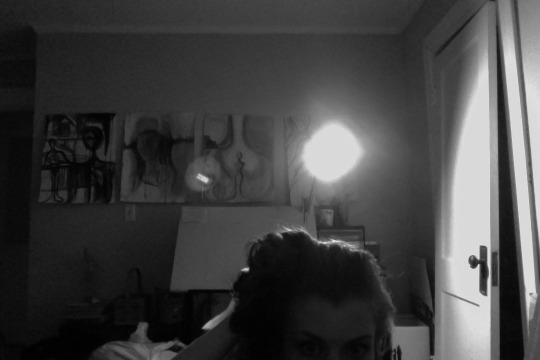
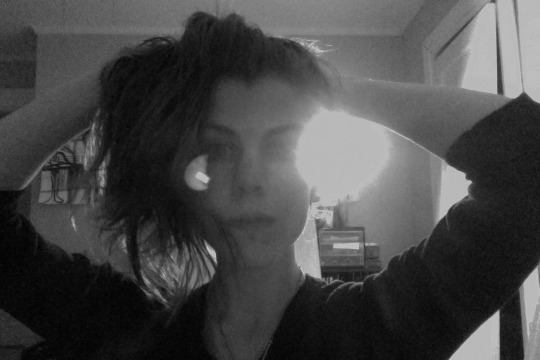
11-25-11 Photobooth In-home art studio East Side House, Saint Paul
Notice the top photo, hanging on the wall the three images. The first one, it has a deep, dark pigmented black and I still remember the feeling of the brush against the paper. That mixed media series remains one of my favorites to these days - perhaps there are 8-10 pieces within in; a story of setting free what words can not encapsulate. It's tucked away in the attic of my parents garage, along with the plethora of pieces that came out of those years of searching within to find where I had become lost in my own life.
I am at a time now where I can begin to look back and reflect outwardly the experiences of those years when I lived so deeply within my self after starting life over. It is not just time that allows these words I share, I will not give time that value. It is the hard work, and grit, determination, that having a second chance at life, NOT dying, means work as well as reward, extremely uncomfortable situations and feelings and processes, and learning to go through versus around, or over, or under or in any other way of complete avoidance. It eventually comes back in one way or another. Trauma does not hide. It will present itself at every opportunity. An opportunity also for me to confront, and see, and take in, and breath despite the truth.
Avoidance means safety, often, to the mind in a troubled dynamic with trauma. This was the case for me. There have been events in my life that were too much to look at directly. I had to learn to tap into these feelings and memories without allowing them to take me over. Creating was the first way I was able to even think of what had taken place in my life and begin to find a way to let it out of me. It was a safe space that I could begin to unravel the images that would stand out in my mind, suddenly coming out of nowhere memories evoked that had been so long hidden, making me feel unreal and out of touch. Flashbacks...I can't begin to explain how scary they are. Or, perhaps, I just don't care to divulge some of the scarier details, is more like it.
Even though I showed and shared this collection of art with people, hanging at cafes, and having openings and celebrations, I never actually talked about the paintings/pieces themselves. I didn't have words and would direct any topics very far away from the truth. In that time, I suppose I just wanted to share them because it was such a need within me to create them. I thought that even if I did not have the words, there must be others too who do not have the words and can relate in some way.
Now, however, I do have the words and abilities to speak of that part of my life. The healing is ongoing in my mind, something that never ends, it is just a living of life, however, I have done the intense work through brainspotting trauma therapy, primarily, as well as medication therapy and my general therapist who has seen me since the age of 18. The triggers, the activation points, the memories no longer hold me in place, frozen. They simply are.
Yes, if I do not care for my self I am much more susceptible to the CPTSD taking over. However, I can count on one hand the number of episodes within the last two years. Compare this to years of daily episodes, and episodes lasting days and weeks and months. I just did not know what was happening. The gratitude of finally receiving the help I needed still moves me. I am continuing to find ways to live a lifestyle that furthers the health and wellness of my self and my life. It endlessly intrigues me, this exploration, the condition of being human.
I'm reminded that we all live our stories. I'm reminded that I do have so much control of my story, and some of it just is what it is, and I can choose the lens in which I take the narrative to heart. What is the story I am telling my self?
[free write; unedited]
0 notes
Note
Why do people think Mike’s character is “ruined” if they don’t make him gay or bi in the final season? I understand he’s done some hurtful things to will and el, but he’s a teenage boy. Just because a character has been an asshole at times, that doesn’t mean the character is “ruined” or “makes no sense,” does it? If Byler isn’t canon in S5, won’t that mean you just misunderstood the character?
While I think that it might be a reach to say that it ruined his character, I do think that it would make a lot of the narrative elements of the show and how they built up Mike and Will's relationship make less sense. While in real life, I would typically agree that some people just "act like that" because they have an off day or whatever, but we have to remember that Mike is an intentionally written character with motivations and narrative direction, which means that what we see on screen about how Mike interacts with others and how he responds to situations is inspired by the lens with which the Duffers have written him. Mike's behavior over the course of the show has been rather inconsistent, especially when it comes to El and Will. While there are things that have stayed pretty constant about the way Mike thinks and perceives (i.e. his ability to plan and strategize under pressure, his deductive reasoning, his blame-shifting), we're able to tell a lot about Mike by the way his more inherent traits change over the course of the show and in relation to these characters (his going from an active, leading role in his friend group to becoming the passive partner that feels inferior to his girlfriend and his going from being incredibly overprotective over Will to basically ignoring him and pushing him away). I do think that a lot of Mike's motivations would seem to make less sense if we took everything from this season at face value. One of the strongest examples of this, I believe, is the entire setup to this season's arc. At the end of season 3, we see El confront Mike about what he said to Max in Hopper's cabin (when he blurted out that he loved El), and Mike immediately starts backtracking, saying he doesn't remember and that it was the heat of the moment. While you may be able to explain this away as Mike just being nervous because he doesn't want to tell El first, the reaction we get from Mike after El says "I love you too," does not suggest this. If Mike had been worried about saying this first, then we should have seen him relieved to hear El say she loved him, but instead we get this moment in which Mike is as stiff as a board when El kisses him, not kissing her back and keeping his eyes open. When she walks away, he looks utterly confused. If you wanted to write this off as just him being awkward, sure, I guess you could, if it didn't play such a huge narrative role in season 4. In this season, Mike and El's main arc is about how Mike still can't tell her he loves her. They've been together for over a year and a half, and Mike has not told her. This is no longer him just being awkward, this is him intentionally avoiding. At the end of the season, we get Mike's reasoning to be that he thought that the day he lost El would "hurt more" if he said he loved her, and aside from the fact that this was a recycled sentiment from Will's van speech, if we actually look at the direction of the narrative this season, we know that this doesn't make sense. When Mike describes his fight with El to Will as something they "can't come back from," Mike says this while knowing full-well what El wants him to say to her. If Mike genuinely loved El in the way she wanted him to, he wouldn't describe it as something they couldn't come back from, and he would have told her he loved her when she was crying over it in her room because that would have been the way to guarantee not losing her, but instead he deflects and gaslights her. While Mike doesn't have the best blueprint for romantic relationships, the issue is not that he can't be vulnerable, because we see him throughout the season consistently being able to be vulnerable and express his feelings with Will, he just can't be vulnerable with El. To me, it would take a lot more mental gymnastics to read this situation as Mike being genuinely in love with El than to deduce that he probably doesn't feel that way and just doesn't know how to tell her.
But even putting aside Mike's individual character motivations for a second, if we look at the way that his relationship with Will is structured, it would make a lot less sense narratively if the intention of the writers and showrunners was not to be setting these two up romantically. We get direct contrasts between scenes with El and Mike and Mike and Will that showcase the stark tonal difference, and the one that is framed more romantically, is the relationship between Mike and Will.
Mike looks confused when his girlfriend tells him she loves him,
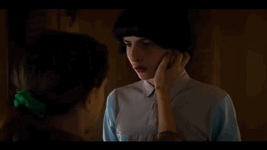
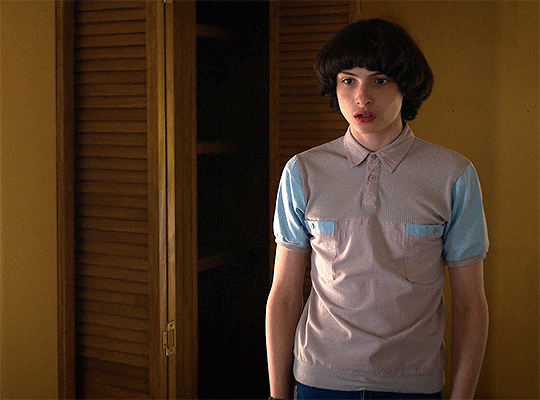
Meanwhile he looks the happiest we've seen him all season when Will tells him he won't join another party.
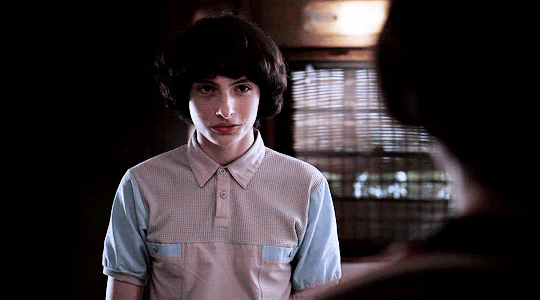
Mike and El's breakup is framed as a comedic girlboss moment, and when Max tells El Mike will come crawling back to her, we see Mike complaining on the couch asking what he did wrong and eating a bag of chips, making no real effort to win El back until Lucas suggests it,
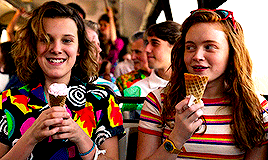
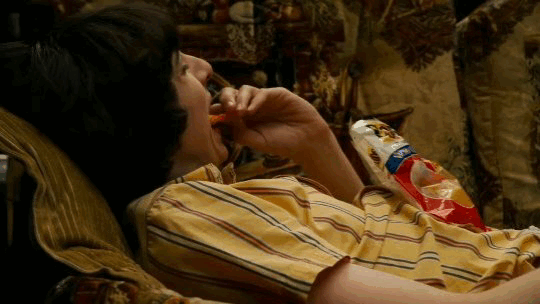
Meanwhile Mike and Will's fight is framed dramatically, where he begs Will not to leave his house after their fight, then bikes all the way across town in the rain without a second thought to apologize and make sure Will is alright.
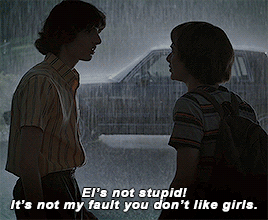

El practically begs Mike to confirm to her that he loves her, and he deflects and gaslights her,
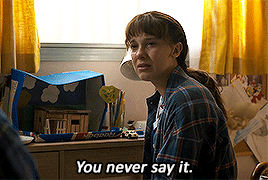

Meanwhile Mike apologizes to Will for being self-pitying and petty with him without Will even having to bring it up.

But even if we decide to put this framing contrast aside, Mike and Will are consistently paralleled throughout this season with other established couples whom we know have healthy dynamics and genuine feelings for one another (Jonathan and Nancy, Lucas and Max, and Joyce and Hopper), meanwhile El and Mike's relationship is paralleled to Karen and Ted's relationship, a loveless marriage, and El and Dr. Brenner's relationship, a complete power imbalance in which El feels othered.
If the Duffers wanted to sell Mike and El as a love story, they would not be writing them like this.
#byler#byler nation#byler endgame#ask#mike wheeler#will byers#el hopper#st#stranger things#mike x will#will x mike#will byers is gay#mike wheeler i know what you are
242 notes
·
View notes
Text
Mag 26

Return of the queen! Can't wait to hear all about your fucked up little adventure Sasha.
Also notable that both she and Martin expressed a desire to record a statement immediately after a traumatic incident. That's definitely the Eye's influence.
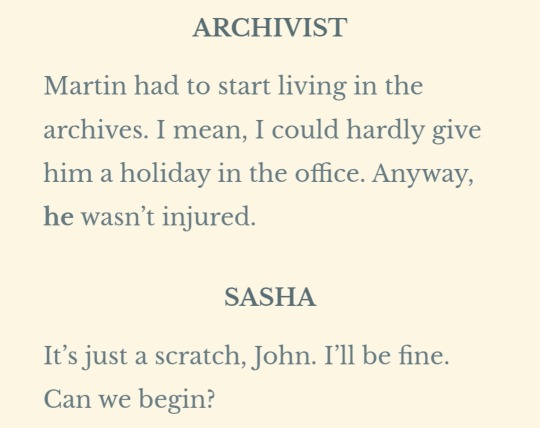
Sasha in Jon's office like:
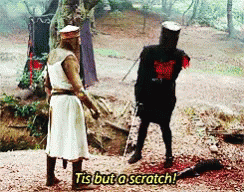
Also new fanfic idea: Martin's holiday in the office.
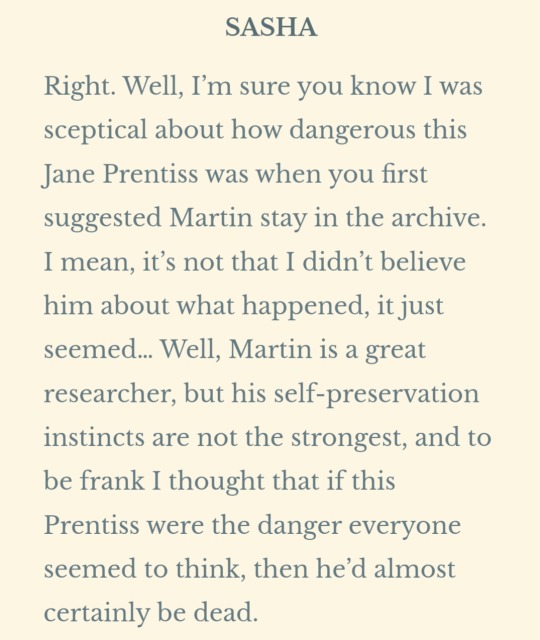
Okay, I'm shifting into Defend Martin Mode, I'll have to stop and take some deep breaths. The fucking gall of Sasha to criticise Martin's self-preservation instincts after the shit she's been up to!! AHHHH. He outlived you!!!
The way she discounts Jane Prentiss as a threat just because Martin survived makes me want to scream. He's only alive because Jane kept him alive on purpose to mess with him!! As if Sasha could have done any better!! AHHHHHH!
Deep breaths didn't help me. Must move on.

I pulled this quote for one word: colonisation. It's so grim. Death by colonisation. I hate it.
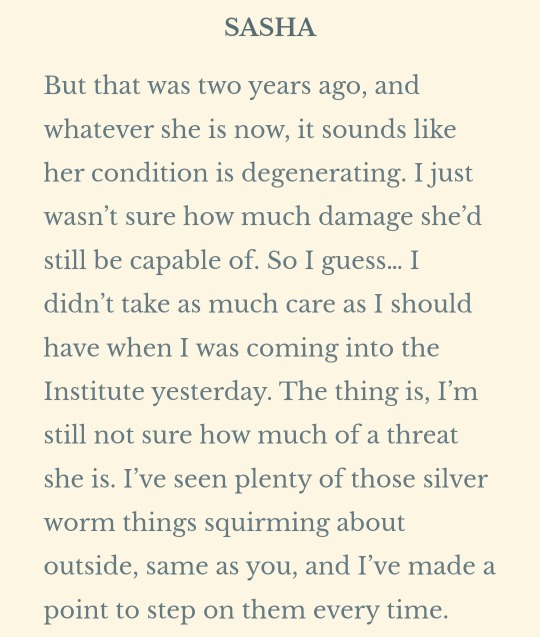
This is a very rational response to the situation from Sasha. She doesn't know she's living in a horror story! Of course it would make sense that the woman who's suffering from some kind of parasite would be getting weaker and sicker the more time passes. Unfortunately, Sasha is living in a horror story, so monsters only get stronger and more dangerous the longer they survive.
But I'm not sure that downplaying Jane as a threat follows Sasha's logic. The threat of Prentiss isn't physical assault, it's colonisation. That's like saying a plague victim is less infectious the closer they get to their deathbed.
And finally, another instance of the narrative outright telling us that Jon is an unreliable narrator. He's been seeing worms outside and didn't tell us! That makes sense for the framing device, obviously. These tapes are still 'research materials' and not his personal journals, so there's no reason for Jon to mention the worms outside while recording a statement. But it's good to be reminded that there is a lot going on in the archives that we aren't hearing about.
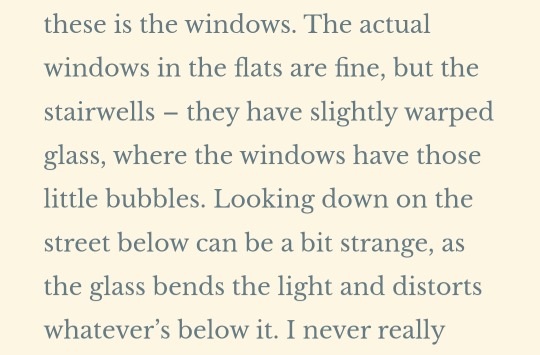
My headcanon for why Michael approached Sasha rather than Tim used to be that she had some sort of either natural inclination towards or family history of mentall illness (something that would leave her vulnerable to the Spiral). But this detail has made me reconsider. Now I think Michael approached her because she had these cool distortion windows that allowed him to make a dramatic entrance.

This is such an endearing little insight into Sasha's life (she does quirky things to add fun into her daily routine!), but I'm also going to call it out as Eye behaviour.
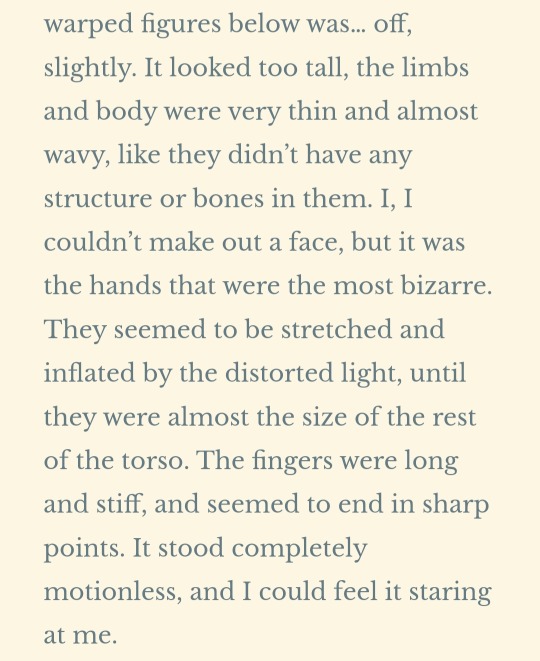
Urgh, his hands are the same size as his torso?? I thought he just had long spirally fingers! This is yuck. I get why the fandom started calling him Michael Fuckhands.
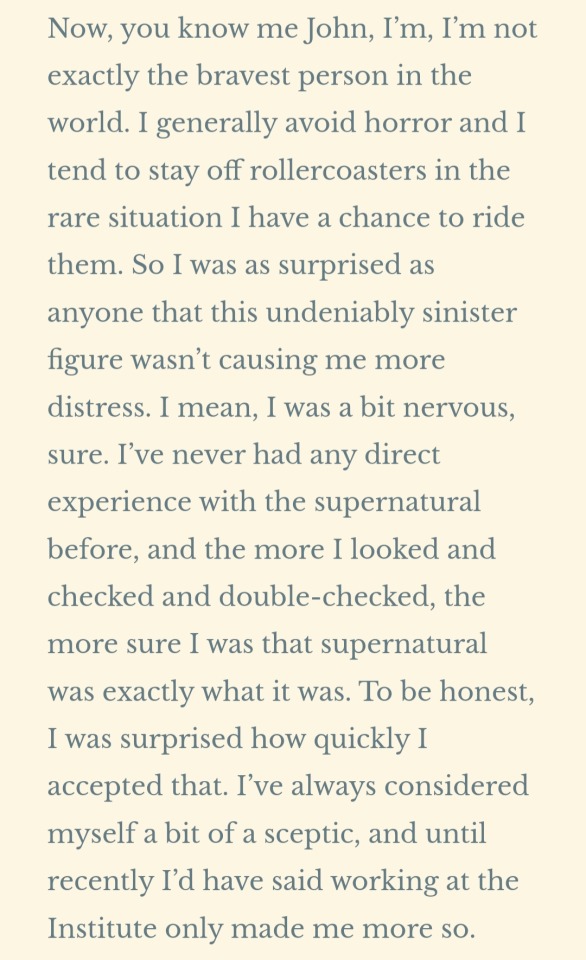
She's not exactly the bravest person in the world 🥺🥺🥺 She generally avoids horror 🥺🥺🥺
Eternally interested in scepticism among paranormal researchers. Sasha says that working at the Institute made her more skeptical, despite the fact that we know she transferred out of Artefact Storage because she couldn't stand being around the cursed items all the time. I think the fact that our only insight into the Institute is through the lens of genuine paranormal manifestations really distorts our view. The vast majority of what they deal with aren't actual accounts, and most of their work is disproving the fake stuff. The actual statments are outliers, so maybe it does make sense to become more sceptical the longer you spend working on all the other statements.
Still, the moment Sasha is confronted with a genuine manifestation, she understands and accepts what she's seeing. It's wild that she's not afraid, but at least she's not in denial.
78 notes
·
View notes
Text
I truly cannot see a direction to take Mike's character in other than revealing him to have been struggling & coming to terms with his queerness (and, therefore, feelings for Will) all this time without him otherwise ultimately coming off as, at best, insensitive and, at worst, a complete asshole hardly better than their own bullies.
and look, I'm not one to be picky in the whole gay vs bi vs unlabeled Mike debate because, honestly, as long as we get Byler in the end it's a win in my book
BUT, that being said, I personally believe the most narratively complete & compelling way to explain his actions over the course of, really, all four seasons will be to reveal that he is gay.
And this is because I believe the true depth of his character arc and coming development is fully contingent on him having realized that not only 1) is he attracted to boys, but also 2) that he is not attracted to girls.
Mike's POV has been intentionally hidden from the audience for a while now, meaning his thoughts and his internal struggles have been hidden. We do understand that his sense of self worth (in the gutter, it is) is rooted in how well he thinks he can serve others — in what he can do for them, in how he can be of use.
In s1, we see him quickly find a role for himself upon meeting El, when she was freshly escaped and new to the world outside the lab. He could care for her and teach her and protect her. And then that becomes a role he can fulfill for Will in s2, where he could comfort him and understand him and save him.
But the problem is...as we go into s3 and then into s4, that role for Mike begins to change. El is no longer asking Mike to hide her away in his basement or to look after her or protect her like he used to be able to do.
Now, she is asking him to love her. She needs him to love her.
But he can't do that. Not in this way, at least. So if she no longer needs him to serve her in the only way he knows how, and if he can't serve her in the way she needs him to now...what can she need him for at all, then?
Before this change, the role he carved out for himself with El made it easy for him to hide in a society that demonizes the LGBTQ+. He could still be accepted in society in his conformation to heteronormativity. And maybe he could've been happy, because he does love El (even if it's not the way he's supposed to). But then, she is suddenly needing more from him than he can provide. This is a role he does not know how to fill convincingly, one he cannot truly be happy in, and now suddenly everything he has been trying to escape and hide away from has now been thrust into the limelight.
But, maybe, he can still have a place with the people around him. With Will. Maybe he can still be accepted as he begins to confront this part of himself.
Well...that is, until his role with Will begins changing too. In his mind, suddenly Will is making new friends and painting for a girl and pulling away. He is doing better without Mike. He is moving on. And if he no longer needs saving and no longer needs their friendship (and certainly couldn't, to Mike's imagination, ever feel the way he does), then what is left for Mike to still hold onto?
Maybe he has no choice anymore BUT to conform. To step into the role he believes El needs him to fill because it may be the only one remaining for him now. If he doesn't, he may lose everyone.
So, in my own interpretation, it is under the lens of Mike being gay that his story becomes much more conflicting and its resolution that much clearer. Because if he has come to understand that he cannot love El the way she wants him to but also believes the person he does love that deeply could never love him the same, then, it is through his confession to El that he ultimately resigns himself to the same unhappy, loveless life he sees in his parents and he sacrifices his chances at ever truly being at home in his own body and with his own feelings. He will be losing the opportunity to ever fully accept himself for who he is as he thrusts himself headfirst into what essentially is to become another role, another act of service. And, while he does honestly care a great deal for El, it will never be what either of them truly long for and, in the end, they will both suffer for it.
Now, at last, coming into s5 with all of this on the table — Mike's arc becomes about him learning his value as his true self and learning that his ability to be loved is not tied to what role he can play in society or fill in a person's life. And it is through learning this — through learning the truth of Will's feelings — that...both of them, really, will come to understand that the way they love and need to be loved can only be fulfilled by each other.
And it is with this that they will find acceptance within themselves for who they really are.
look im prepared for byler not happening but what would be unacceptable to me is if they give no insight whatsoever into mikes behaviour and perspective the past seasons
bc if not conflicting feelings for his best friend what could possibly explain his actions
#byler#byler analysis#mike wheeler#mike wheeler analysis#i love them so much#mike is a boykisser you can't convince me otherwise#i let the byler brainrot take over did any of this even make any sense?#stranger things
149 notes
·
View notes
Note
Hi what was your favorite season of The Flash?
Season 1, absolutely and for sure. I've often said "season 1 is my happy place" and meant it.
It gives us Captain Cold every 6 episodes and establishes that wonderful dynamic of fascinated antagonism between him and Barry that I can't get enough of.

But it's not just about Cold.
S1, the plot with Reverse Flash has these emotional stakes that feel real, and the intense frustration (in a good way) of not knowing why Eobard hates Barry the way he does. The horror of that realization unfolding as Barry can no longer deny that Wells, his mentor, is the person who killed his mother, even if he can't explain why or necessarily how.
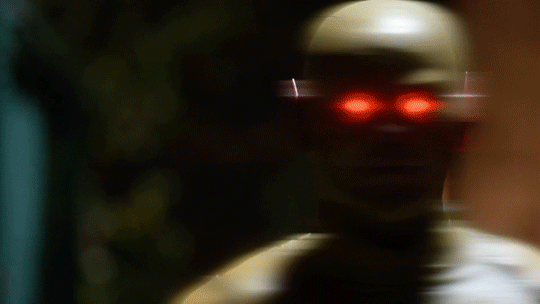
Cisco and Wells is honestly such an important dynamic too and when I tell you I screamed when the Reverse Flash killed Cisco before time was rewound, whew. The drama! We didn't know about time travel yet! And then it gets undone and Cisco goes off with Golden Glider and gets kidnapped and we spend the entire episode tense because is this the kind of "death is inevitable" narrative or will he escape the jaws of death so narrowly? Ahhh!!
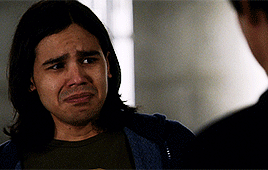
(seriously Cisco's betrayal, figuring out Wells before anyone else, confronting him, it all hurt so good)
And season 1 Eddie and Iris! I love their romance, I love the way it feels authentic, the way they grapple with it. And Eddie's sacrifice! Later seasons each continue to introduce a new CCPD blond(e) -- Eddie, Patty, Julian, Ralph, etc., but the stakes don't feel near so important, especially not once you notice it's just a revolving cast of a new CCPD-adjacent blond character and there's no point in becoming attached. So many of the subsequent seasons try to recapture the magic of S1 and fail because they're regurgitating a formula instead of finding something new, something as Fresh as what Eddie brought to the story.
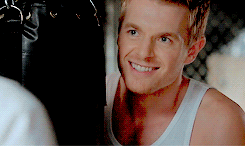
Controversial take but I also like the messy unrequited thing we get from Barry for Iris in S1, and the fact that the show actually acknowledged the sticky "we're kind of like siblings" in that season was a good thing, actually. And I get why they brushed that aside later and stopped mentioning it, but I personally enjoy the complicated uncomfortable messiness they setup there and am still a little sad they ignored it entirely on the relationship follow-through and didn't allow it to be a thing they had to actually Navigate.
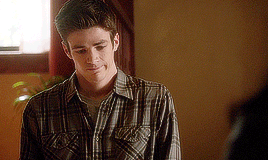
On the topic of fucked-up stuff, S1 also called out the pipeline and Cecile straight up told Joe that no, that's messed up, and Joe told Barry it's messed up, and the heroes suffered consequences for their messed up actions when Len and Mick and Lisa released the pipeline Rogues and it was - chef's kiss.
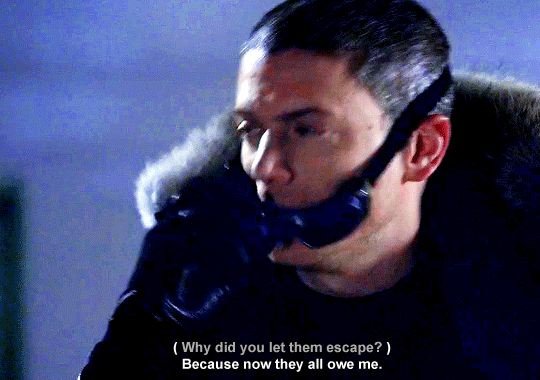
Also tbh I feel pretty similarly about the first half of season 2, before they took Len and Mick off to Legends and we stopped seeing Lisa and any chance of the full/proper Rogues disappeared along with Goldenvibe (my beloved, best canon ship).
The back half of season 2 disappoints with Jay being revealed as Zoom because it's just, as I said, regurgitating season 1's plot and it's lame as hell to me, but up to that it's really enjoyable. We get great Rogues episodes with the Snart backstory and with Weather Wizard busting Len out of prison. I also like Harry's introduction and character, and I like Earth-2 and Killer Frost and the setup to our Caitlin's story on that front, and I like Patty and hate that they wrote her off so abruptly mid-season.
And Zoom was genuinely sinister and Barry's spinal injury and how Zoom dragged him around the city like a ragdoll was honestly O.O and I was here for it.
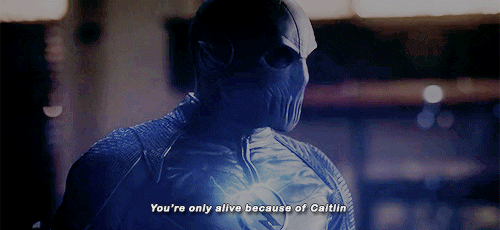
I like horror, and S1-S2 felt like they had these moments of angst and horror and good guys doing awful things without being cleanly excused by the narrative, and all these sticky and messy things that just made them more interesting.
The seasons that follow have some of this (Flashpoint, Barry going back in time to get the speed formula from Wells, Savitar being the consequence of Barry's actions, Barry going to prison) but they seem to hit less hard, possibly because the plot moves on too fast and we see less of the trauma fallout, or possibly because I just have a higher expectation for them to unpack these things and their consequences after an initial season in which they set them up?
Meaning Season 1 gets to fuck around but I expect the later seasons to find out, and am disappointed that they don't spend as much time as I would like on the emotional/character side of the "find out" piece?
#season 1 is my happy place#the flash season 1#season 1#canon critical#kind of#wank for ts#but also a lot of joy#it's not that there's nothing in the later seasons i enjoy#there actually is quite a lot#it's just that they don't come together as well for me#they tend to start strong and lose me in the second half?#and somewhere along the way it started to feel more like a cw family drama#than a cw monster/case of the week#and the horror became less horrifying and the stakes became a bit silly#but there's so much to love about this show#across all seasons#more than i could ever list in a single post
58 notes
·
View notes
Note
the way the show dismiss jack and how he should deal the wrong dean caused him reads as another attempt from chuck to make dean the perfect hero– which ultimately erases not just jack but dean as a person too. if dean can't face the consequences of his actions he can't improve or grow as a character, forever stuck on chucks narrative.
for jack, if (in terms of the narrative) he should be the one breaking cycles, he should be able to put dean through some serious evaluation of his past interactions with kids, his desire to have children of his own and how his past with john affected all of that
Ooh, interesting stuff here, thank you! I want to gently ease the chuck stuff away from this and keep the accountability with the actual human writers messing up their own story, but yeah really interesting points!! Re Chuck stuff: I don’t personally find it very interesting to read it through that lens (though if you do, fair enough!) because the thing that’s happening (which I do find compelling to think about) is specifically that the human writers of supernatural couldn’t figure out how to grapple with the cruelty Dean had done to Jack and still keep him as sympathetic a lead as they wanted to, leading to them making the slightly wild decision of not acknowledging very significant events ever again, in turn making s15 an incredibly unnerving viewing experience. And you’re right! It’s a missed opportunity for character development for Dean, as well as doing Jack a massive disservice. But it’s not because of Chuck’s narrative, it’s because of lazy, cowardly writing by Dabb and co.
And yeah, you’re absolutely right – Jack is a massive missed opportunity as a character! Facing Dean with the results of his actions / everything else you lay out there could have been really interesting. In theory, if you’re going to try to make your lead ‘turn into their father’ like that, it makes sense to actually confront them with it, so we can have some interesting character stuff with that! But then instead, the writers want to preserve the status quo of having Dean always be in the right, and the fact that he tried to lock a child to forever and then nearly killed them puts jeopardises too much, so instead we just…. never talk about it again. Which is really crap.
#also this is making me think about a s15 where chuck made them forget on purpose#and then a bit later is like ‘oh btw!! here’s your jack cruelty memories back!!’#and then everyone is reeling from that for like an episode#(just salmondean. it’s more interesting is cas and jack still remember)#including reeling from the fact that jack DID remember and just never said anything about it ever#anyway – thanks for the ask!#jack kline#asks#anonymous#spn#worded thoughts#dean winchester#chuck spn
20 notes
·
View notes